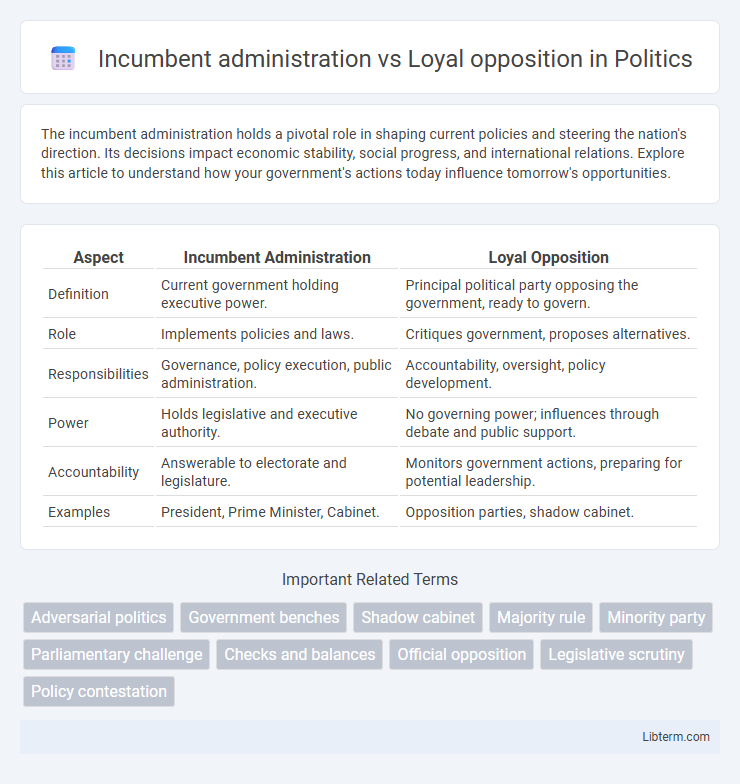The incumbent administration holds a pivotal role in shaping current policies and steering the nation's direction. Its decisions impact economic stability, social progress, and international relations. Explore this article to understand how your government's actions today influence tomorrow's opportunities.
Table of Comparison
| Aspect | Incumbent Administration | Loyal Opposition |
|---|---|---|
| Definition | Current government holding executive power. | Principal political party opposing the government, ready to govern. |
| Role | Implements policies and laws. | Critiques government, proposes alternatives. |
| Responsibilities | Governance, policy execution, public administration. | Accountability, oversight, policy development. |
| Power | Holds legislative and executive authority. | No governing power; influences through debate and public support. |
| Accountability | Answerable to electorate and legislature. | Monitors government actions, preparing for potential leadership. |
| Examples | President, Prime Minister, Cabinet. | Opposition parties, shadow cabinet. |
Defining the Incumbent Administration and Loyal Opposition
The incumbent administration refers to the current government officials holding executive power, responsible for implementing policies and managing state affairs during their term in office. Loyal opposition consists of political parties or groups not in power that challenge and scrutinize the incumbent administration while remaining committed to the democratic framework and peaceful transfer of authority. This dynamic creates a balance by ensuring accountability and offering alternative governance ideas within a stable political system.
Roles and Responsibilities of Each Side
The incumbent administration is responsible for executing government policies, managing public resources, and ensuring national security while implementing legislation passed by the ruling party. The loyal opposition plays a critical role in scrutinizing government actions, proposing alternative policies, and holding the incumbent accountable through parliamentary debates and committees. Both entities contribute to a balanced democracy by facilitating governance and promoting transparency through their distinct but complementary functions.
Historical Perspectives on Government-Opposition Dynamics
Historical perspectives on government-opposition dynamics reveal that the incumbent administration often controls legislative agendas and public resources, shaping political discourse and policy outcomes. The loyal opposition traditionally serves as a critical watchdog, offering alternative policies and holding the administration accountable while maintaining allegiance to democratic principles. This interplay has evolved across different political systems, influencing stability, reform, and the balance of power between ruling parties and opposition forces.
Core Policy Differences and Ideological Divides
Incumbent administrations often prioritize policies that reflect their established governance strategies, such as economic stability and incremental reforms, while loyal opposition parties advocate for alternative approaches emphasizing structural change and social equity. Core policy differences typically center on government intervention levels, fiscal priorities, and regulatory frameworks, illustrating fundamental ideological divides between conservatism and progressivism. These ideological splits manifest in contrasting views on healthcare, taxation, and civil rights, shaping the broader political discourse and voter alignment.
Strategies Used by the Incumbent Administration
The incumbent administration employs strategies such as leveraging state resources, implementing popular policy initiatives, and controlling media narratives to maintain political advantage. It often uses voter outreach and targeted communication campaigns to strengthen its electoral base. Additionally, strategic appointments and legislative maneuvers help consolidate power against the loyal opposition.
Methods of the Loyal Opposition in Holding Power Accountable
The loyal opposition employs rigorous parliamentary questioning, budget scrutiny, and oversight committees to hold the incumbent administration accountable. Through strategic use of media and public debates, they expose policy failures and advocate alternative solutions. Persistent monitoring of legislation and government actions ensures transparency and promotes democratic checks and balances.
Political Communication: Messaging, Media, and Public Opinion
Incumbent administrations strategically utilize political communication to reinforce their achievements and shape public opinion through targeted messaging and media platforms. Loyal opposition employs contrasting narratives and critical discourse to challenge policy decisions, mobilize supporters, and influence electoral dynamics. Both actors engage in sophisticated media management and message framing to sway public sentiment and maintain relevance in democratic processes.
Impact on Governance and Legislative Processes
The incumbent administration holds executive power, driving policy implementation and legislative agendas, thereby directly shaping governance and public services. The loyal opposition provides critical oversight and alternative policy proposals, fostering democratic accountability and preventing authoritarianism. This dynamic balance influences legislative efficiency, policy innovation, and the overall stability of political institutions.
Challenges Facing Both Camps in Modern Politics
Incumbent administrations face challenges such as managing public expectations, responding to rapidly changing policy issues, and maintaining voter trust amid media scrutiny. Loyal opposition struggles with presenting viable policy alternatives, overcoming limited access to resources, and mobilizing public support in a polarized political climate. Both camps grapple with adapting to digital misinformation and the demand for transparency in modern governance.
The Future of Incumbent-Opposition Relations
The future of incumbent-opposition relations hinges on enhancing democratic accountability and fostering constructive political dialogue. Effective governance depends on incumbents embracing transparency while opposition parties prioritize policy alternatives over partisan conflict. Strengthening institutional frameworks and encouraging civic engagement will be pivotal in redefining the balance between ruling administrations and loyal opposition groups.
Incumbent administration Infographic

 libterm.com
libterm.com